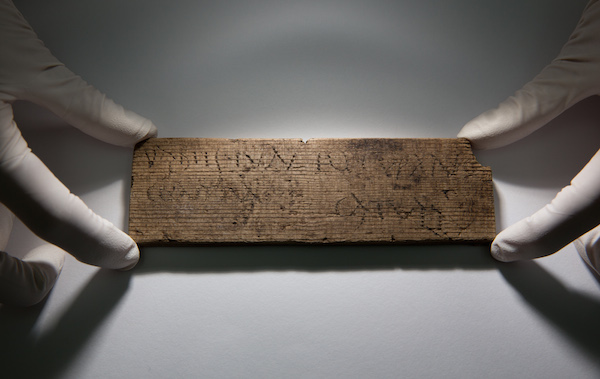
The first hand-written document in Britain. Photo DANIEL LEAL-OLIVAS/AFP/Getty Images.
Archaeologists have discovered the first handwritten document in Britain while excavating the foundations for the new Bloomberg European headquarters in the historic City of London district.
London is a very, very old city—with the Roman Londinium dating back to 43 AD—and therefore when there’s building works in certain parts of the city, it’s not a huge surprise to come across an ancient artifact or two (or 3,000 skeletons, even).
In this case, the haul of important items includes 405 Roman wax writing tablets, 87 of which have proved decipherable, according to research recently published by archaeologists from the Museum of London Archaeology (MOLA).
“As steward of this ancient site and artifacts, Bloomberg has embraced the City of London’s rich heritage,” said Michael Bloomberg in a statement. “And as a company that is centered on communications—of data, information, news, and analysis— we are thrilled that Bloomberg has been at the core of a project that has provided so much new information about London’s first half-century.”
The find provides insights in to life and business in early London. Photo DANIEL LEAL-OLIVAS/AFP/Getty Images.
The wax tablets reveal details of the lives of early Londoners, ranging from documenting of slaves and free men, events and names of some of the first Londoners.
Archaeologists also found the earliest known handwritten document in Britain, which is a financial document dated January 8 AD 57; as well the evidence of someone practicing writing and numeracy (perhaps evidence of a school); and the earliest reference to London, dated AD 65-80.
Over 400 wax tablets were discovered. Photo DANIEL LEAL-OLIVAS/AFP/Getty Images.
“The Bloomberg writing tablets are very important for the early history of Roman Britain, and London in particular,” Dr Roger Tomlin, a classicist and cursive Latin expert who deciphered the tablets, said in a statement. “I am so lucky to be the first to read them again, after more than 19 centuries, and to imagine what these people were like, who founded the new city of London. What a privilege to eavesdrop on them: when I decipher their handwriting, I think of my own heroes, the wartime academics who worked at Bletchley Park.”
The tablets were extremely well preserved, as the wet mud of the Walbrook River—which flowed at the site at one point—prevented oxygen from damaging the tablets once compressed under years of sediment.
“We always had high hopes for the Bloomberg dig, situated in the heart of the Roman and modern city and with perfect wet conditions for the survival of archaeology, but the findings far exceeded all expectations,” said Sophie Jackson, archaeologist and director of MOLA.